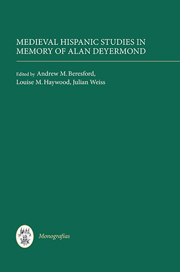Book contents
- Frontmatter
- Contents
- Contributors
- Foreword: Alan Deyermond: A Memoir
- Acknowledgments
- Abbreviations
- Introduction: Alan Deyermond, 1932–2009
- 1 Sanctity and Prejudice in Medieval Castilian Hagiography: The Legend of St Moses the Ethiopian
- 2 The Image of the Phoenix in Catalan and Castilian Poetry from Ausiàs March to Crespi de Valldaura
- 3 On the Frontiers of Juan Rodríguez del Padrón's Siervo libre de amor
- 4 Memory as Mester in the Libro de Alexandre and Libro de Apolonio
- 5 Advancing on ‘Álora’
- 6 Time is of the Essence: Essence, Existence, and Reminiscence in Two Portuguese Poets
- 7 Gómez Manrique's Exclamación e querella de la governación: Poem and Commentary
- 8 The Misa de amor in the Spanish Cancioneros and the Sentimental Romance
- 9 ‘Manus mee distillaverunt mirram’: The Essence of the Virgin and an Interpretation of Myrrh in the Vita Christi of Isabel de Villena
- 10 ‘Nos soli sumus christiani’: Conversos in the Texts of the Toledo Rebellion of 1449
- 11 Vernacular Commentaries and Glosses in Late Medieval Castile, II: A Checklist of Classical Texts in Translation
- 12 Games of Love and War in the Castilian Frontier Ballads: El romance del juego de ajedrez and El romance de la conquista de Antequera
- 13 ‘Esta tan triste partida’ (Conde Dirlos, v. 28a): maridos y padres ausentes
- Index
- Tabula in memoriam
6 - Time is of the Essence: Essence, Existence, and Reminiscence in Two Portuguese Poets
Published online by Cambridge University Press: 05 May 2013
- Frontmatter
- Contents
- Contributors
- Foreword: Alan Deyermond: A Memoir
- Acknowledgments
- Abbreviations
- Introduction: Alan Deyermond, 1932–2009
- 1 Sanctity and Prejudice in Medieval Castilian Hagiography: The Legend of St Moses the Ethiopian
- 2 The Image of the Phoenix in Catalan and Castilian Poetry from Ausiàs March to Crespi de Valldaura
- 3 On the Frontiers of Juan Rodríguez del Padrón's Siervo libre de amor
- 4 Memory as Mester in the Libro de Alexandre and Libro de Apolonio
- 5 Advancing on ‘Álora’
- 6 Time is of the Essence: Essence, Existence, and Reminiscence in Two Portuguese Poets
- 7 Gómez Manrique's Exclamación e querella de la governación: Poem and Commentary
- 8 The Misa de amor in the Spanish Cancioneros and the Sentimental Romance
- 9 ‘Manus mee distillaverunt mirram’: The Essence of the Virgin and an Interpretation of Myrrh in the Vita Christi of Isabel de Villena
- 10 ‘Nos soli sumus christiani’: Conversos in the Texts of the Toledo Rebellion of 1449
- 11 Vernacular Commentaries and Glosses in Late Medieval Castile, II: A Checklist of Classical Texts in Translation
- 12 Games of Love and War in the Castilian Frontier Ballads: El romance del juego de ajedrez and El romance de la conquista de Antequera
- 13 ‘Esta tan triste partida’ (Conde Dirlos, v. 28a): maridos y padres ausentes
- Index
- Tabula in memoriam
Summary
In grateful and affectionate reminiscence
of Alan and Ann
Time, like an ever-rolling stream (so E. M. Forster maintained), bears all her sons away unless they are very careful. here I shall be looking at some ways of being careful that have commended themselves to two of the few Portuguese poets who have yet succeeded in breaking through the glass ceiling of their still rather unfashionable language and been admitted to the Western canon: Francisco Sá de Miranda (1481?–1558) and Luís de camões (c. 1524–80).
For Antonio Machado, ‘toda la imaginería/ que no ha brotado del río’ was nothing but ‘barata bisutería’ (‘De mi cartera’, st. 4). Dámaso Alonso found Machado's sense of Time less significant than his sense of place, but while he may only have scraped a Pass in Philosophy at the Institución Libre de Enseñanza, as an assiduous reader of Schopenhauer he would have been well aware that the mere flowing of a stream is meaningless without a point of reference: the fact that no one can bathe twice in the same river only becomes significant after someone has bathed in it once; and mutability and duration alike acquire meaning only when the downward course of life both converges with the onward flow of time and, as in the tradition of temporal imagery presided over by horace's Solvitur acris hiems (Odes I, iv), forms a tangent with what T. S. Eliot called ‘the point of intersection of the timeless/ with time’ (‘The Dry Salvages’, v, 201–2).
- Type
- Chapter
- Information
- Medieval Hispanic Studies in Memory of Alan Deyermond , pp. 139 - 148Publisher: Boydell & BrewerPrint publication year: 2013



